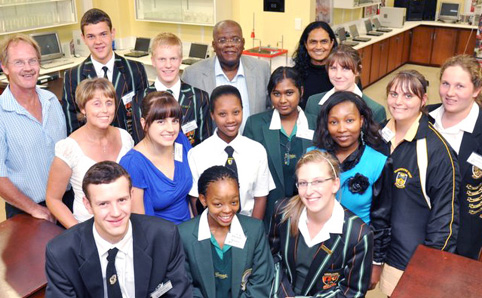 |
|
The Thirteen Scholarship winners are seen here with: Back: Mr Cobus van Breda (Project Manager, School for Continuing Education, far left), Prof. Jonathan Jansen (Vice-Chancellor and Rector of the UFS, Second from the right), Prof Dennis Francis (Dean of the Faculty of Education, on the right), Middle: Ms Elizna Prinsloo (School for Continuing Education, left) and Ms. Pearl Nhlane (SANRAL, right).
- Photo: Stephen Collet
|
Thirteen learners from the University of the Free State (UFS)’s School for Continuing Education (SCE) were successful in their applications for school scholarships at SANRAL (South African National Roads Agency). This represents more than a third of the successful applications countrywide.
The SCE’s ICT Laboratory aims to enable and encourage more learners to enter into science related studies and careers. To achieve this, 180 selected learners from Grade 10, 11 and 12 are exposed to activities at the ICT Laboratory every year. “It is an attempt not only to foster a positive attitude towards Mathematics and Science amongst learners, but also to raise their knowledge and skills levels through e-Education in Science and Mathematics,” says Mr Cobus van Breda, Project Manager of the programme.
As part of the programme, learners have the opportunity to apply for a scholarship at the sponsor, namely SANRAL (South African National Roads Agency). The scholarship not only covers all school and hostel fees for the particular year, but also includes stationary as well as school and sports outfits of the learner.
At a recent information session for successful learners and their parents held at the UFS, Ms Pearl Nhlane of SANRAL congratulated the learners and said that “SANRAL is recognising the hard work of the learners by investing in them”. Prof. Jonathan Jansen, Vice-Chancellor and Rector of the UFS, in turn thanked SANRAL for their initiative and told the learners “that one has to take the gap when one gets the opportunity”, indicating to the learners that the scholarship can be seen as such an opportunity, since it can possibly pave the way to study benefits in future.